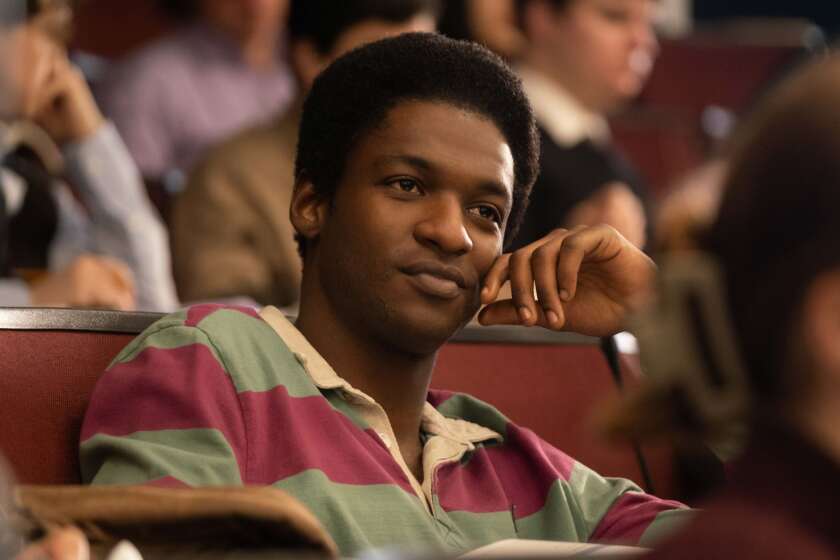Review: ‘Shoplifters’ is a magical film about ordinary people forming a makeshift family
“Happy families are all alike,” Leo Tolstoy wrote, but Leo Tolstoy never met the Shibatas, front and center in “Shoplifters” and happy in a way incontestably their own.
The winner of the Palme d’Or at this year’s Cannes Film Festival and another triumph for admired Japanese director Hirokazu Kore-eda, a master of unforced intimacy, this wise and insightful film is delicate, poignant and unexpectedly powerful.
More than that, under Kore-eda’s sensitive, casually assured direction, “Shoplifters” imperceptibly deepens as it goes on, revealing secrets and lies and expanding its emotional effect on the way to its moving ending.
For “Shoplifters” well understands that family is the most intimate and problematic entity in all our lives. It calls on us to rethink its very nature, its limits, pleasures and responsibilities, unfolding a story that grows in complexity and intimacy almost without our knowing it.
“Shoplifters” is in some ways the culmination of more than two decades of exemplary work, often involving family questions, by Kore-eda, whose previous credits include the one-of-a-kind “After Life,” “Nobody Knows,” “Still Walking” and the Cannes jury prizewinning “Like Father, Like Son.”
Although the multi-generational Shibatas are without a doubt happy, they are also an apologetically unconventional group, a family whose roots can be traced back to both Charles Dickens’ “Oliver Twist” and the classic intergenerational dramas of Japan’s Yasujirō Ozu.
Not to put too fine a point on it, but from the preschool-age youngest girl to the oldest grandmother, they are — as the title indicates — hustlers and scam artists every one, existing on society’s fringe, but bright-eyed despite it all.
This good cheer comes from father Osamu (Kore-eda veteran Lily Franky), a genial man employed as a day laborer on Tokyo construction sites but supplementing the family income with strategic shoplifting.
After all, Osamu believes, as he tells anyone who will listen, “Whatever’s in a store doesn’t belong to anyone yet.”
In fact, “Shoplifters” opens with a scene of artful pilfering in a neighborhood supermarket, executed with the precision of a military operation by Osamu and his 12-year-old son Shota (Kairi Jyo)
When the two return home, we meet the rest of the clan, including mother Nobuyo (Sakura Ando), older sister Aki (Mayu Matsuoka) and cranky grandmother Hatsue (the veteran Kirin Kiki, who died in September at age 75).
The film’s actual plot begins with Osamu and Nobuyo taking a walk around their neighborhood on a cold night and hearing a small voice crying and sniveling plaintively from a ground-level balcony.
The voice belongs to Juri (Miyu Sasaki), a woebegone 5-year-old waif with a pitiable face. Sensing neglect and acting on an altruistic impulse, they take her home for the night.
Though Hatsue grumbles, “Can’t you bring home something to make money?,” once the discovery of bruises and scars indicates actual parental abuse, the decision is made to take her in permanently.
As Juri integrates into the family and is shown the ropes of shoplifting, we gradually learn more about the people she shares a house with.
Nobuyo, for instance, works at an industrial-scale laundry, grandmother Hatsue largely, but not entirely, depends on her pension, and Aki turns out to be a soft-core sex worker, dressing up like a schoolgirl and gyrating for anonymous men who sit stoically behind one-way glass.
All these people, even those you might not think would, yearn for human connection and experience the complexity of that need, negotiating shifting relationships with one another as well as a society at large that has its own moralistic point of view and doesn’t necessarily understand the nuances of the Shibatas’ lives.
Taking little Juri into their circle, though done with the best intentions, leads to a crescendoing series of consequences that put the family in kinds of jeopardy no one anticipated while revealing things no one could know.
One of the paradoxical qualities that makes Kore-eda such an exceptional director is that his people-oriented stories — and this one is no different — tend to sound more ordinary and less magical than they play on-screen.
In some ways, it makes more sense to describe a film like “Shoplifters” by what it doesn’t do as much as by what it does. It doesn’t oversimplify, it doesn’t overemphasize obvious points, it doesn’t hit viewers over the head.
Instead, aided by sensitive, empathetic acting, Kore-eda uses a quiet, humanistic touch that moves without smothering, that enables us to see his characters as whole people and to understand the difference between what society says it values and what it actually does.
People and their stories, Kore-eda believes, are what involve us most. Tolstoy would definitely understand.
------------
‘Shoplifters’
In Japanese with English subtitles
Not rated
Running time: 2 hours, 1 minute
Playing: Opens Nov. 23 at ArcLight, Hollywood, Laemmle’s Royal, West Los Angeles
More to Read
Only good movies
Get the Indie Focus newsletter, Mark Olsen's weekly guide to the world of cinema.
You may occasionally receive promotional content from the Los Angeles Times.











